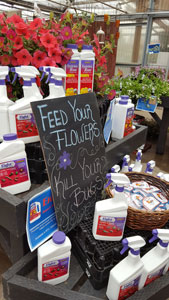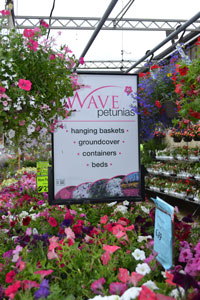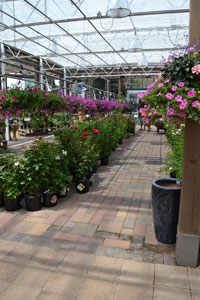7/31/2017
Six Steps to Next Level Retailing
John Johnston
The lawn & garden industry enjoys a strong sense of community that’s uncommon, if not unheard of, in other fields. Independent garden centers have taken different roads to renewing success, and many have discovered like-minded peers who are willing to share their talents and experiences to help others.
We all read and hear from long-tenured industry consultants who dispense their theories and recognize business pitfalls, but the “secret sauce” in our industry’s recipe for success is the owners and associates who are in the trenches every day, making change happen. A huge thank you to all who step off the sidelines and contribute to the greater good of our industry!
Among all of the success stories and business-renewal efforts, several common themes prevail. If you’re looking to take your retail operation to a higher level, here are six strategies to put you on the right path.
1. Connect with Your Community
Events drive footsteps into garden centers. Think about the customers you want to draw and the incentives that’ll attract those folks. These aren’t necessarily “fire sales” or “super specials.” Any event that offers a unique experience or creates value for your target audience pays a huge dividend over time.
Families, for example, are likely to connect with events that start new traditions. Hayrides, berry picking, petting zoos, dog and/or cat adoption drives, and face painting are all popular options. Food trucks are also trending lately to bring unique flavor to your store’s offering.
Events that build awareness are becoming a big draw for Millennials. Think about ideas that could strengthen your store’s connection with the local community. Dare to be different! Over the past decade, garden centers have seen success with events centered on bee pollinators and Monarch butterflies. In regions that support winemaking activities, efforts to provide equipment, plants and even tastings of local wines go a long way toward attracting a specific customer who will seek out your store for recreational purposes. Indoor gardening is a wide-open topic that bolsters interest in growing herbs and edibles for year-round enjoyment.
2. Simplify fo r Quick Sales
r Quick Sales
Today’s consumer is a moving target. With less time for what they have to do versus what they want to do, shoppers don’t have the patience to linger in a display with too many options for, say, pest control or lawn care. Without dedicated staff in every aisle to address every question or need, the purchasing decision becomes too difficult and the consumer walks away both frustrated and empty-handed. We must sell differently.
Simplification has shown to be a good antidote. Statistics indicate that consumers and staff make faster and more universal purchasing decisions in chemistry needs for example, when the number of selections is reduced. Granted, there will always be a targeted product and active ingredient for a specific purpose, but generally, chemicals for lawn and garden are broad-use products that can cover many bases. Perhaps stocking multiple products with the same active ingredient is no longer necessary. Know what’s on your shelves and how to sell it. Your selections are also an extension of your store brand and image.
 3. Sign of the Times
3. Sign of the Times
Point-of-purchase (POP) signage is an important part of selling, especially when store associates aren’t readily available. Manufacturers no longer provide huge quantities of header cards, banners and other POP materials in one- or two-color options. Today’s consumer has defined triggers in capturing their interest with signs, banners and shelf talkers.
Today’s POP materials rely more on high-resolution graphics, moisture-resistant substrates and brighter colors to attract the consumer’s attention. Text is often short bullet points and the fine print is minimal or non-existent, so the messages are clear, easy to read and easy to understand. Discounts are often shown as net dollar values versus percentages because today’s consumers are unwilling or unable to do the math. Today’s consumers expect speed and efficiency in all areas of their lives; we must keep pace.
4. Ladies First
Merchandising exploded onto the scene back in the 1950s with signage that worked to build strong brands. The most recognized giants of that era included Coca-Cola, Craftsman, Kodak, General Electric and Sunbeam.
Then in the 1960s, the television era drove the next stage of brand recognition, especially in the auto industry: Advertising sought to make cars wonderful, sexy status symbols. A sure way to attract the prettiest ladies in town was with that Ford Mustang or Thunderbird convertible! But when have you ever seen an ad that made pest control “sexy?”
Today’s status symbol is getting someone else to do the yardwork and lawn maintenance for your home. As for attracting the ladies? Well, let’s give it some thought. Lawn and garden manufacturers move their audiences with imagery and messages that tout natural, wholesome and, often, organic ingredients that are safe for the family. The newest advertising encourages today’s biggest gardening consumer, the women, to get behind their products. The inclusion of pets and children in fertilizer ads takes a bit of the edge off the chemical stigma. Take notice of how our industry leaders promote their goods.
 5. Clean Up Your Act
5. Clean Up Your Act
Brick-and-mortar stores need to step it up with brightly lit and clean environments for their customers. From checkout to bathrooms, these expectations are more important than ever. The newest customers aren’t familiar with the term “roughing it.” Stores that prioritize cleanliness are gaining customers, especially women.
Reduce clutter and expand sightlines throughout the store to encourage more exploration by customers. If you sell gift and home décor, resist building out the bases of displays; customers must be able to shop without a tripping hazard.
Spacing is also crucial to delivering a comfortable shopping experience. In high-traffic zones where two-way traffic is necessary, keep your walkways wide enough to accommodate moms, with kids in tow, in BOTH directions. By expanding space when and where possible, you offer consumers the freedom for decision-making in the aisles.
6. Let There Be Light
Few consumers have the courage or patience to venture into retail zones that are dark and/or cramped. Does your store have areas that are poorly lit?
Today’s LED lighting makes it easy to brighten any space, using less wattage than traditional bulbs. Inquire with your electricity provider about energy audits that may save you hundreds of dollars for every year after conversion. Many regional utility companies offer tax credits toward new lighting fixtures that conserve energy and reduce operating costs—a win-win for you.
Take notice of your spotlights and accent lighting. Where might you convert to LED bulbs? Just 10 spotlights, each using 100-watt incandescent bulbs, is the equivalent of running a 1,000-watt hair dryer all day long! Seeing the light is worth the effort and the expense; you can save your business money and drive more sales at the same time.
Plan ahead now to strengthen the connection with your customers in the season ahead. These six steps could lead you straight to a brighter future for your operation.
GP
John Johnston is Retail Education Manager for Griffin. He can be reached at jjohnston@griffinmail.com.